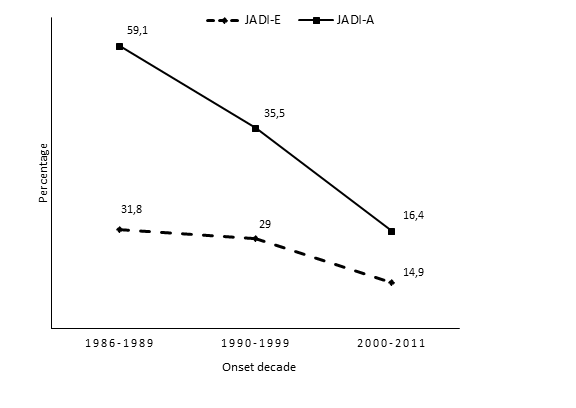Session Information
Session Type: ACR Abstract Session
Session Time: 2:30PM-4:00PM
Background/Purpose: After nearly two decades from the start of the Biologic era, systematic analyses of patients with juvenile idiopathic arthritis (JIA) have shown a high frequency of attainment of inactive disease (ID) and satisfactory levels of physical function and quality of life. However, whether and to what extent the disease prognosis has improved in comparison with the methotrexate (MTX) era is still uncertain.
Purpose of the present study was to compare the long-term disease state, in terms of activity and damage, of children with JIA who had their disease onset in MTX or Biologic eras.
Methods: Patients were included in MTX or Biologic era cohort depending on whether their disease presentation occurred before or after January 2000. Patients in the MTX era cohort and part of the patients in the Biologic era cohort were taken from a previous cross-sectional study published by our group,1 which enrolled 310 patients with disease onset between December 1986 and December 2002. An additional sample of patients with onset in the Biologic era was enrolled in a subsequent prospective cross-sectional study, which included all consecutive patients meeting the ILAR criteria for JIA, who were seen consecutively at the Istituto Gaslini of Genoa, Italy, between January 2015 and June 2017. All patients had disease duration ≥ 5 years and underwent a prospective cross-sectional assessment, which included measurement of disease activity and damage. ID and low disease activity (LDA) states were defined according to Wallace, JADAS10 and cJADAS10 criteria. Articular and extra-articular damage was assessed with the Juvenile Arthritis Damage Index (JADI).
Results: MTX and Biologic era cohorts included 239 and 269 patients, respectively. Patients were divided in the “functional phenotypes” of oligoarthritis and polyarthritis. At cross-sectional visit, patients in the Biologic era cohort with either oligoarthritis or polyarthritis had consistently higher frequencies of ID and LDA than patients in the MTX era cohort. The measurement of disease damage at cross-sectional visit revealed that the frequency of impairment of > 1 JADI-Articular items was higher in MTX than in Biologic era cohort (17.6% versus 11% in oligoarthritis and 52.6% versus 21.8% in polyarthritis). Likewise, frequency of involvement of > 1 JADI-Extraarticular item was higher in MTX than in Biologic era cohort (26.5% versus 16.2% in oligoarthritis and 31.4% versus 13.5% in polyarthritis). The sole JADI items that were detected in more than 5% of patients in the Biologic era cohort were temporomandibular damage in oligoarthritis and polyarthritis, ankle damage in polyarthritis and leg-length inequality in oligoarthritis. The analysis of the temporal trend of damage development over the 25 years of our analysis (1986-2011) highlighted the marked decrease in damage over time and the more pronounced decline in the Biologic era (Figure 1).
Conclusion: Our study provides evidence of the remarkable prognostic improvement obtained with the recent therapeutic advance in JIA.
Reference 1. Solari et al. Arthritis Care Res. 2008;59:1571–9.
To cite this abstract in AMA style:
Giancane G, Muratore V, Marzetti V, Quilis N, Serrano Benavente B, Bagnasco F, Alongi A, Civino A, Consolaro A, Ravelli A. Long-term Outcome of Juvenile Idiopathic Arthritis: From the Methotrexate to the Biologic Era [abstract]. Arthritis Rheumatol. 2019; 71 (suppl 10). https://acrabstracts.org/abstract/long-term-outcome-of-juvenile-idiopathic-arthritis-from-the-methotrexate-to-the-biologic-era/. Accessed .« Back to 2019 ACR/ARP Annual Meeting
ACR Meeting Abstracts - https://acrabstracts.org/abstract/long-term-outcome-of-juvenile-idiopathic-arthritis-from-the-methotrexate-to-the-biologic-era/

